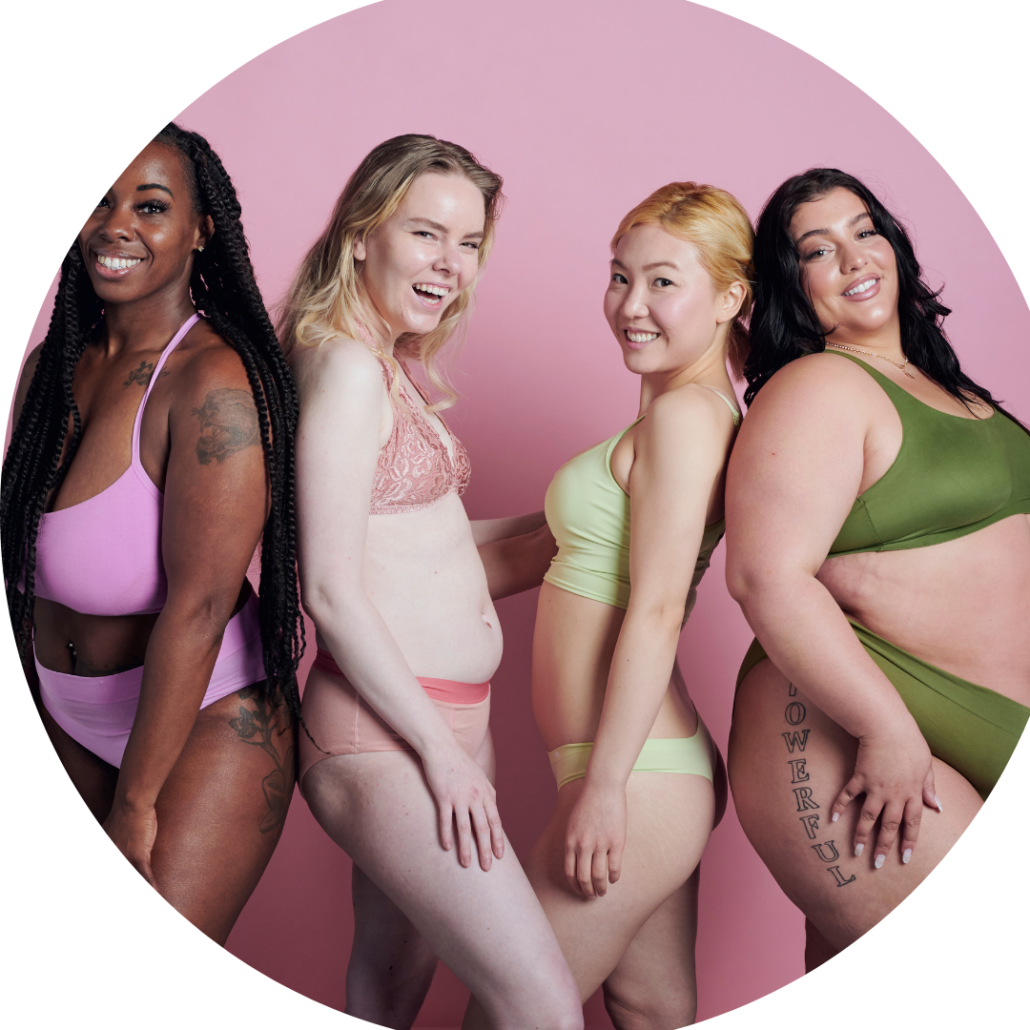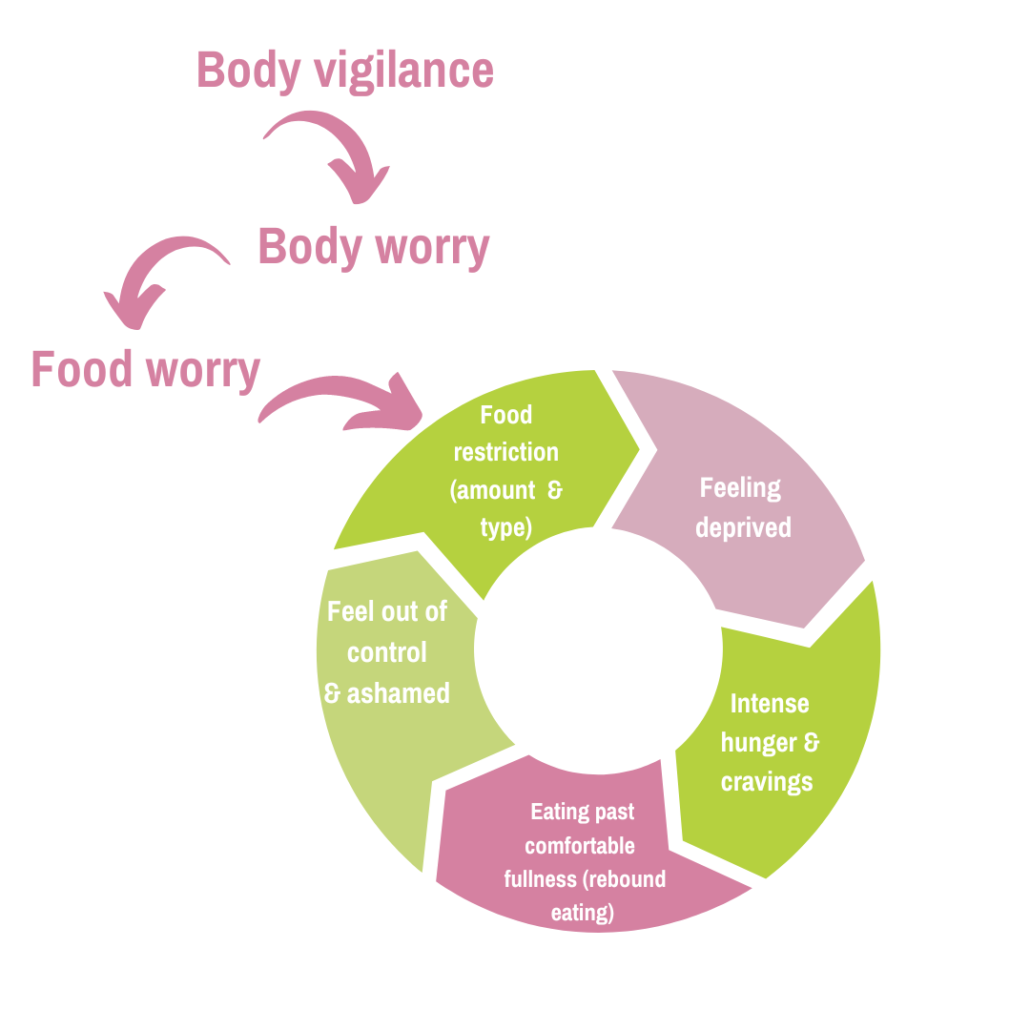Respect Your Body
This is the eighth post in a 10-part series looking at the principles of Intuitive Eating. The previous post in this series was on Cope with your emotions with kindness
It’s hard to reject the diet mentality, make peace with food and honour your hunger and fullness cues if you are constantly at war with your body. That’s why the eighth principle of Intuitive Eating is “Respect Your Body.”
Body respect versus body love
This principle is about respecting your body, not loving it. While the concept of loving your body (and by extension yourself) is a wonderful idea, thanks to the diet culture we live in, many people find it very difficult to relate to the idea of body love and loving our bodies can feel out of reach for many of us. Which is why it can be helpful to move from thinking about loving your body to working towards respecting your body.
Intuitive Eating – which is a non-diet, mind-body approach to health that aligns with the Health At Every Size framework® – recognises that body love is a tricky starting point and that body respect is both more realistic – and more helpful when it comes to caring for ourselves. It’s more realistic because you don’t have to love your body to respect it and it’s more helpful because respecting our body means we’re more likely to take good care of it. This is why, rather than suggesting we need to love our body every day, Intuitive Eating focuses on respecting our body every day.
What does respecting your body mean?
Respecting your body means treating it with dignity, and meeting its basic needs. It is about recognising that your body is ALWAYS deserving of care and respect, treating it with dignity and meeting its needs (both physical and emotional ones) – regardless of its’ size, shape and physical ability.
In Intuitive Eating, the five basic premises of body respect are:
- My body deserves to be fed
- My body deserves to be treated with dignity.
- My body deserves to be dressed comfortably and in a style I like.
- My body deserves to be treated affectionately, with my consent and with respect.
- My body deserves to move comfortably, to the extent it is possible.
Why does body respect matter?
Respecting your body is essential if you want to become an Intuitive Eater because:
- If you are at war with your body, it’s hard to be at peace with yourself and with food.
Body vigilance leads to body worry which in turn leads to food worry and that fuels the cycle of dieting. Continuing to hate your body and believing it needs to be changed, will most likely keep you in or lead you back into diet culture and dieting behaviours. To really ditch the diet mentality, there needs to be a shift in how you view and treat your body. Being respectful to your body moves the focus away from dieting and your body’s appearance towards body function. Many people find it helpful to think of their body as their home and the vessel that allows them to experience life.
2. When you respect your body, you are more likely to take good care of it. Trying to shrink our bodies prevents us from focussing on the behaviours that truly promote our physical and mental health — behaviours that research shows improve health even when there are no changes in weight (CW: stigmatising language used in the research article) . However, when we accept that our body is always deserving of care and respect, it helps us care for our physical and mental health in ways that feel good and are accessible and realistic for us. This can include managing chronic stress, getting enough quality sleep, eating a variety of foods, and finding ways of moving you find fun.
Body acceptance – the first step in respecting your body
Each of us are born with a genetic blueprint for potential height, weight, health, foot size, eye colour and a whole host of other characteristics and the first step in respecting your body is to accept that your body will strive to maintain its genetic blueprint for weight (which is what we see when most people regain weight they lost in the long term and often more after dieting). Body respect asks you to accept the genetic blueprint for your body, by not forcing your body to be smaller than it is meant to be, in the same way that you wouldn’t try to make your feet smaller so you can wear a smaller size shoe. Your genetically determined weight is the weight range your body will maintain when you are nourishing yourself adequately over time and when you are not exercising excessively. It is the weight range your body naturally wants to settle at in order for it to function optimally.
Thanks to the diet culture we live in, many people want to reach a weight that can only be achieved by restrictive eating and excessive exercise, if indeed it can be achieved at all. Since none of us are immune to diet culture, you may have a weight you have in mind that you see as your own “ideal weight”, but it likely won’t match your genetically-determined weight. The truth is we cannot choose our weight. This can be hard to hear and you may even need to mourn for the body (and the privileges that come with a smaller body) that you have been chasing along with the temporary illusion of peace that dieting gave you in the past. Recalling what dieting has cost you in the past (physically, mentally, emotionally and socially) and why you decided to ditch diet culture can be extremely helpful when working through this process.
Your body is not the problem, our culture is
Keep in mind, too that the problem isn’t with your body, it’s with the fatphobic culture we live in, which drives both diet culture and weight stigma. You were not born hating your body. From the time we are toddlers, we are continually bombarded with very narrow ideas of what the “perfect”, “healthy” body looks like, so it’s understandable if you judge yourself and others in a negative light, if you or they don’t fit our culture’s “ideal” body type. The overriding message is that being in a bigger body means you’re not healthy or you’re lazy or “not taking care of yourself”.
These messages are examples of weight bias which is defined as negative, prejudiced attitudes and beliefs about weight. Weight bias often appears in the form of stereotypes, such as laziness, lack of motivation or lack of self-discipline. However, we cannot tell anything about a person’s health based on their weight (or BMI) because weight and BMI are very poor proxys for health. Similarly, being in a bigger body says nothing about someone’s worth or moral character as a person.
When that prejudice is directed towards ourselves or others, it becomes weight stigma. Weight stigma perpetuated by others including friends, family, co-workers, or strangers, is known as external stigma. This can look like being teased about your weight, receiving unsolicited advice to lose weight from health professionals, comments on the shapes and sizes of others, being denied a job or a job promotion and much, much more. Intense shame can result, which can lead to weight stigma being self-directed (known as internalised stigma).
Either way, the idea is that if someone feels bad about their body or their weight, this will motivate them to lose weight. But that doesn’t happen because stigma and shame are not effective motivators for positive change.
In fact, research shows weight stigma is profoundly harmful (CW: stigmatising language used in the research article). It can have a life-long negative impact on a person’s mental and physical health, their body image and also their relationship they have with food and exercise. Research suggests weight stigma is associated with psychological stress, poor self-esteem, poor body image, depression, body dissatisfaction, increased blood pressure, type 2 Diabetes and increased mortality risk. The intense shame that is the result of weight stigma, can also lead to people adopting dangerous disordered eating behaviours.
As if that were not enough, weight stigma is also a real barrier for many people seeking healthcare. Many people who have been victims of weight stigma by medical and other health professionals delay seeking treatment because of these experiences.
Intuitive Eating recognises the harm that weight stigma does and teaches us that our bodies are worthy of respect as they are today, in this very moment.
What does body respect look like?
So, what does body respect actually look like? Body respect can look like:
- Regularly nourishing yourself with meals and snacks.
- Gentle movement that feels good in your body.
- Regular medical and dental check-ups.
- Taking care of your body (basic self-care, hygiene, taking medicine).
- Talking to your body in a loving, kind way. Reframe negative body thoughts with self-compassionate thoughts.
- Wearing underwear and clothes that are comfortable, don’t rub, pinch or dig. Get rid of clothes that don’t fit anymore. Buy some clothes that are comfortable and make you feel your best.
- Seeking out pleasurable activities.
- Resting when you need to.
- Expressing gratitude daily for what your body does, rather than how it looks.
- Not comparing yourself to others as it only leads to unnecessary suffering and focussing instead on your unique personal qualities that having nothing to do with appearance like your sense of humour or generosity, your artistic or musical talents or the things you have worked hard to achieve in your life.
- Celebrating body diversity, for example by curating your social media feeds (finding accounts that show and promote different types of bodies, and unfollowing accounts that make you feel uncomfortable or critical about your body).
Practising body respect means letting go of things like:
- Food rules and restricting food/dieting.
- Weighing yourself. Remember weight does not tell you anything about your health.
- Punishing yourself with exercise or earning food through exercise.
- Pinching, joking or being cruel to your body.
- Squeezing into clothes because of the size on the label.
- Judging your own or other people’s bodies.
- Body shaming (yourself or others).
Which of these things can you start doing today to show your body respect?
Short and sweet
If you are at war with your body, it’s hard to be at peace with yourself and with food. Continuing to hate your body and believing it needs to be changed, will most likely keep you in or lead you back into diet culture and dieting behaviours. However, no matter how hard we try to shrink ourselves, we cannot change our genetics. And the more we strive to shrink ourselves, the more we are left feeling unsatisfied with our bodies and ourselves. To really ditch the diet mentality, there needs to be a shift in how you view and treat your body. This is where body respect can really help. The more you can practice body respect, the more easily you will be able to practice the other principles of Intuitive Eating and the sooner you will be able to make peace with food.
Ready to take the next step? Contact me and request a complimentary call to find out more about Intuitive Eating and how it can help you truly nourish yourself – body, mind and soul.






